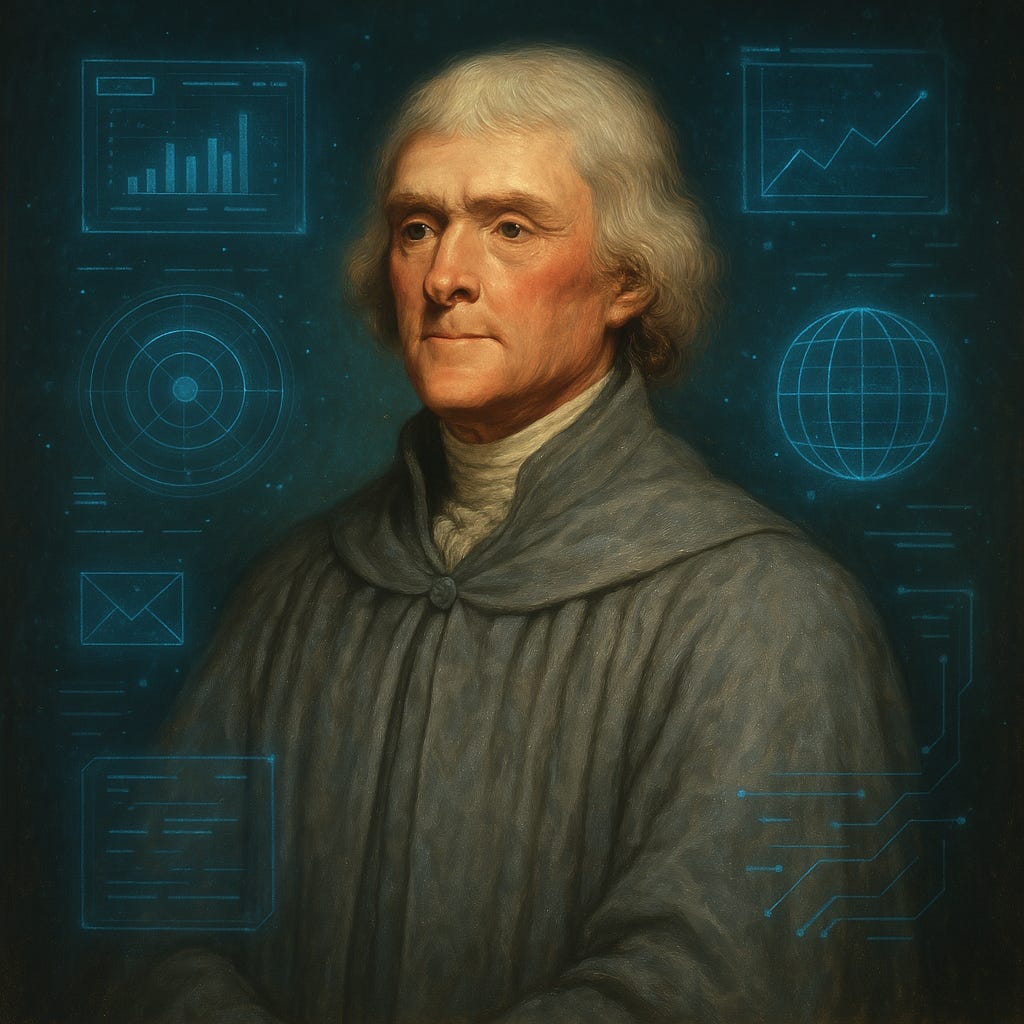Upgrading and Sacralizing Our Social Operating System
The liberalism of Jefferson and Locke is ready to be improved for a civilizational renaissance.
Liberalism—freedom’s doctrine—functions much like an operating system for society.
It sounds bloodless at first. Uninspiring. But functionally, it’s true. And in that truth, we find something vital we must protect, renew, and build upon.
This flexible framework allows diverse *applications* such as religions, cultures, and industries to operate. We refer to this capacity to accommodate diverse subgroups as pluralism, an indispensable hallmark of any liberal order.
Yet, as any operating system has its limitations, liberalism does too. In discovering those limits, we can protect, never jettison, our doctrine and its protocols.
Illiberal Apps
Certain religions, cultures, and industries—once installed—can undermine the very system that hosts them. These *apps* might be termed illiberal because they threaten to corrupt or disintegrate liberalism.
Religion. Some interpretations of Islam, for example, exhibit illiberal tendencies by seeking to supplant a free society with Sharia law, a system that clashes with the values of pluralism and freedom. Even if one thinks, as I do, that 90 percent of the world’s Muslims are peaceful, that means there are still 200 million Muslims who believe there is no higher good than dying as a martyr on the way to building a Caliphate. (See Europe is in Trouble.)
Culture. To the left, social justice fundamentalism pursues an anti-meritocratic, intersectional regime that stifles open discourse and seeks a long march through the institutions. To the right, national conservatism blends theocracy, protectionism, and socialism lite in ways that similarly erode liberal principles. This means we are beset by two major illiberal forces, one on each flank.
Industry. Corporatism, the entanglement of business and government, subverts consumer-driven market processes as central authorities select winners and losers on behalf of corporate favor-seekers. The military-industrial complex exemplifies this phenomenon. It’s lobbyists claim to safeguard freedom but threaten its foundations. The same can be said for green-energy zealots with their whale-killing offshore wind turbines, or advocates of *Nation First* taxpayer-funded industrial policies.
Such tensions explain nostalgia for *classical liberalism*—a term that emerged not just because the prior term liberalism had been co-opted, but because it hints at the potential for renewal. But even classical liberals argue among themselves about the mode and manner of instantiation.
Still, liberalism, like any operating system, can be upgraded. The question is: What might this upgrade look like? Neoliberalism, freighted with misconceptions and rhetorical baggage, never inspired anyone, as it was coined as a pejorative. Enhanced liberalism should include either absent or underdeveloped elements, offering a more robust and adaptive social operating system.
How can we protect liberalism and its laws without lapsing into contradiction or becoming illiberal ourselves?
Elements of an Enhanced Liberalism
I believe any upgraded liberalism must rest on five key elements.
Integrate the Law of Consent—a principle rooted in contracts and mutual agreements—across all human relationships, supplanting domination, legal subordination, and centralized control. Accepting the Law of Consent begins with an oath:
As I seek happiness, harmony, and prosperity for all people,
I will abstain from initiating harm,
And unite in solidarity with others
To build a society of Human Respect.
With such an oath, you register your commitment to the Law of Consent, which is the basis for all other law.
Furthermore, an upgraded liberalism would:
Unleash innovation and entrepreneurship in domains traditionally reserved for central authorities, such as governance, education, and welfare.
Emphasize the vital dynamics of family, community, and mutual aid as bottom-up phenomena complementing market processes.
Nurture a vibrant liberal culture and morality, grounded in the practice of virtues. Liberal culture and morality exist and sometimes overlap with other cultural and moral systems, as long as they are peaceful (i.e., they do not violate the Law of Consent).
Foster a pluralistic, even syncretic, spiritual framework that taps into humanity’s sense of mystery and wonder, sanctifying the liberal order while deepening its resonance. (This is why I am working on The Grey Robes.)
In summary, liberalism as a social operating system is both powerful and vulnerable.
Liberalism’s power lies in its ability to accommodate and include multiple competing conceptions of the good, even competing doctrines like conservatism and progressivism, so long as these are peaceful. Liberalism’s vulnerability lies in its asymmetry concerning competing doctrines. For example, peaceful, local socialism can exist within a broader liberal order, but the reverse is rarely, if ever, true. (There have been exceptions, such as “two systems, one country,” but predators and parasites are seldom so patient. Beijing couldn’t wait.)
Further, liberalism’s pluralism is both a strength and a weakness in that it must guard against illiberal "apps" that threaten its integrity. An upgraded liberalism that includes consent, innovation, community, virtue, and spirituality offers a path forward that is far more rooted and not so bloodless.
Far from a sterile reboot, this vision invites us to reimagine freedom’s architecture, ensuring it remains a living, thriving system for future generations.






Excellent piece. A great way of thinking about liberalism and the things that can undermine the political philosophy. It also suggests ways to promote this 2.0 version of liberalism.
The illiberal apps seem endemic to social political systems. I see them as seemingly harmless individuals, therefore easy to burrow into collective institutions.